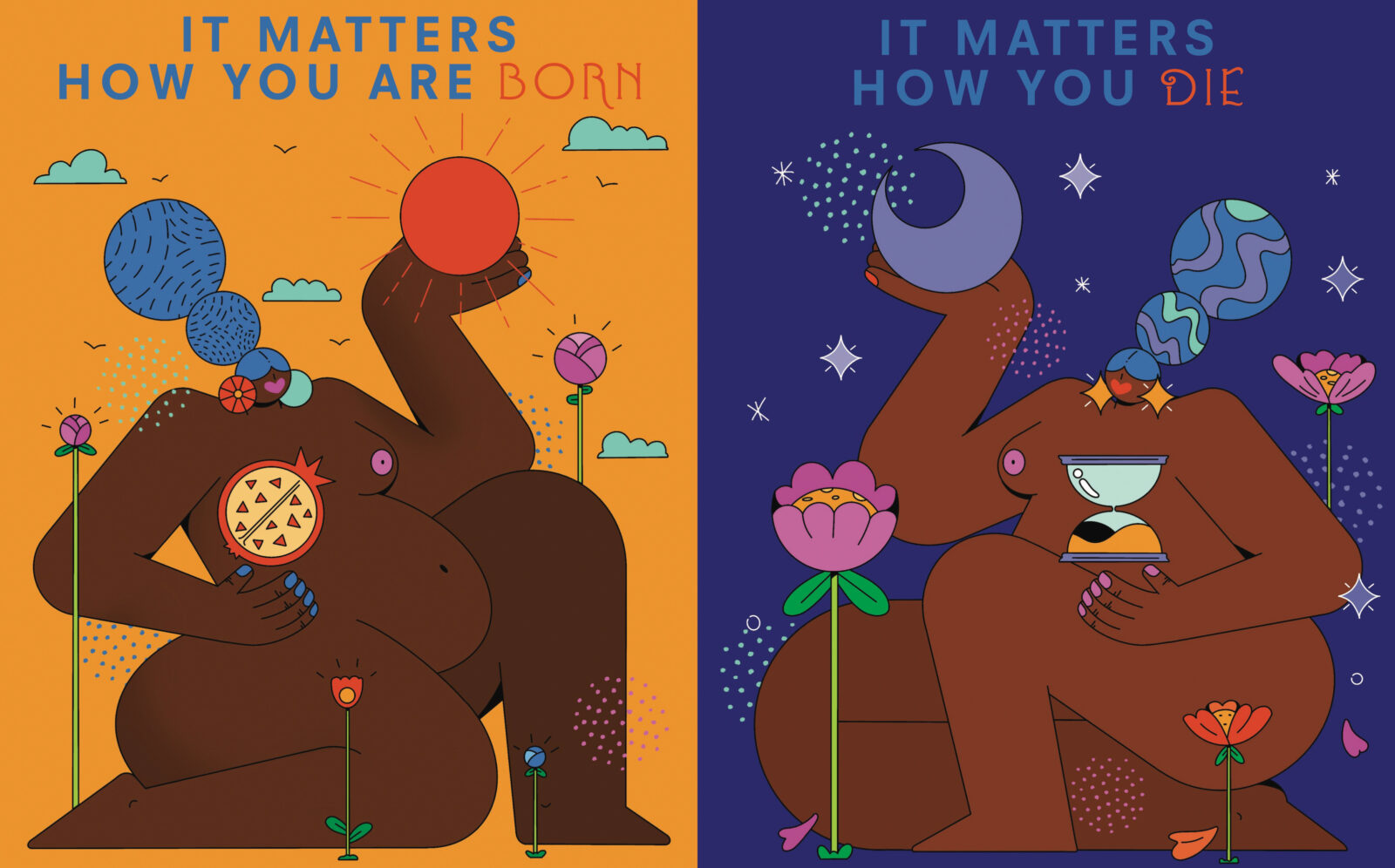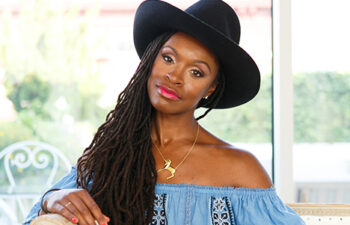
Illustrations by Sofia Romagnola

Illustrations by Sofia Romagnola
Latham Thomas: My role as a birth worker is a calling. I get to provide support as a mentor and educator and leader of a global doula training program, Mama Glow, and I get to help usher in the next generation of birth workers into the field. I see myself as a servant leader, and I’m in service of women and birthing people.
The most meaningful thing about this work is that you get to support people at the threshold of change in their lives. You get to watch people transform and become new versions of themselves. Two decades ago I was pregnant with my son. It’s such a distant experience for me, but every time that I support someone, I’m reminded of my own experience, my own vulnerability. I’m also reminded that we are all connected by this incredible experience of having lived inside of another person who supported us, cultivated us, fed us, nurtured us, birthed us earthside.
The United States is the most dangerous place in the developed world to give birth, so a challenging part is having to fight against injustice, to constantly be advocating on behalf of individuals who should be seen in their dignity and their humanity. This is important work, but it’s also very exhausting. We’re navigating racist and misogynistic systems that make it hard to continue, but we must continue.
I’ve given birth myself, and what I learned is that the primal template that is in place for us—and what is possible for us to experience—is so deep. It’s not just about having a safe, dignified, healthy birth. It’s also about having transcendence, because birth is really a trance. Birth is a meditation. When we can allow women and birthing people to feel safe and dignified and supported and unobserved, when we trust in their ability to birth, then we have different birth outcomes. It’s everyone’s birthright to have joy and feel empowered during their birth experience.
Support is critical at every life transition. I think about the reproductive life cycle, and the life course in general, and how there’s no support. Menses, pregnancy, abortion and loss, postpartum, menopause—there’s no support. At every juncture we lack the structural tools to properly support people, and not just through clinical pathways, but also emotional, mental, spiritual, ancestral pathways for support and healing. I believe that being held and nurtured and swaddled through life transitions helps us to embrace the next phase of our life with more ease.
When people feel ungrounded or untethered because of uncertainty, I get them to focus on the things that are inside of their palm, what they can control. When they get to a place where they feel safety around what they can control, we start to uncover and explore the factors that are necessary for them to feel safety to be able to let go of control.
Everything is uncertain for the entire pregnancy. You don’t know what’s happening on a day-to-day basis. Part of what I try to connect people to is the magic and mystery of the process. That helps people to get out of their heads and more into their bodies.
I’ll talk about my own birth because that birth I witnessed and was transformed by, and it was the catalyst for a lot of the work that I do. My son’s birth was on a Sunday afternoon at Elizabeth Seton Childbearing Center, a freestanding birth center in New York City. I was visited by my ancestors. It was a moment of deep transcendence. I felt myself separate from my physical body and ascend and hover over my body and watch my son be born. Because I didn’t have language or a framework for this experience, I didn’t tell the story for a while. Then I came to know other people who had similar experiences, and that influenced me to share my own truth.
When you are allowed the space to navigate the experience and allow your hormones, your brain, and your body and your baby to work together, it is a completely different experience than how we currently navigate birth within our hospital system. I’ve witnessed so many beautiful births since, and every single time, it’s like the first time.
PART OF WHAT I TRY TO CONNECT PEOPLE TO IS THE MAGIC AND MYSTERY OF THE PROCESS.
Doulas sit at the threshold of change. That space of transformation is part of the life cycle, and the life cycle includes death. Sometimes we witness death, and we’re there to support people navigating miscarriage, infant loss, stillbirth. The skills that I bring to doula work also are skills that I brought to support my grandmother as she transitioned into the afterlife. It’s really impacted how I view death. I think about death a lot, honestly, probably more than a lot of people. It makes me more grounded in the present moment, because I know this life isn’t forever.
I feel like the relationship between birth and death are so close and aligned. It matters how you are born, and it matters how you die. Our focus should be on ensuring safety and dignity, as well as a sense of belonging and nurturing, for both of those experiences.
Because we’re in the midst of a maternal health crisis in this country, there are so many women who look like me who are dying unnecessarily at the hands of medical racism because they are Black. We know that sixty percent of these deaths could be prevented. You could be carrying life and your life does not matter. So that is real for me—that life is delicate in that way.
I believe that there is a threshold, and that we go through rites. Just like we have birthing rites, I think there are death rites. As we arrive, we move through a liminal space and find our way into integration in our bodies. I think that as we leave, there’s this moving out of our bodies where we dissolve. We pass through this liminal space and then separate.
Everyone who I’ve talked to who has experienced a near-death moment has spoken about how heavenly and beautiful it felt to separate and go where they were going before they were brought back. I would hope that passage feels safe so that we could prepare ourselves as we leave our physical bodies and consciousness to move into the next realm. Part of what we do as doulas is to help people in spirit and in flesh prepare themselves to transition from one plane to the next, from one aspect of self to the next.
Alua Arthur: I am a death doula and a death educator. A death doula is somebody who does all of the nonmedical care and support of the dying person and the family or circle of support through the entire process. So no matter what the needs are—be they emotional, spiritual, practical, logistical—anything nonmedical death doulas can support with. As a death educator, I’m constantly finding ways for people to be in and to live in relationship with their mortality that add value to their life itself. I also teach death doulas at Going with Grace.
Getting to sit in big conversations with people about their life, about the things that create meaning, purpose, joy, connection, and presence for them is so exciting. It’s also highly rewarding in that I’m nosy and so I get to dig into people’s lives a little bit with them. But it feels good to be able to reflect something to somebody who has an opportunity to make a difference in their life based on a conversation that we’ve had. When people are getting close to the end of life, what is most rewarding is the opportunity to see if we can make the dying process a little more gentle. Obviously, none of us can do anything to take away any of the difficulty, the existential agony that people might experience at death. But if I can make it so that somebody isn’t also thinking about what’s going happen to their mail after they die—as a benign example—then everybody wins.
I think some people would think that I’d say all the death and all the dying, but that’s not it at all. It’s the building the business part. I’m looking forward to the day when the world can see the death doula as a “legitimate” role. I’m using air quotes around legitimate because legitimized by who? But my hope is that this job can be mainstream enough so that doulas don’t also have to be managing business while they’re trying to support people.
DEATH CONSTANTLY REMINDS ME WHAT A MIRACLE AND MYSTERY IT IS TO EXPERIENCE LIFE.
I’m not surprised by how much I love it. I’m not surprised that the tide has started to turn toward it. I think maybe one of the more surprising parts is I thought that people would be more resistant to the work than they are. I thought that I would always be the weird girl at the party who was talking about death in the corner with one person. Well, I am that weird girl sitting in the corner talking to one person at the party. However, I was not prepared for how open people would be to the conversation. Although I feel like another part of me, the deep, deep, deep down inside part of me, always knew that people are down, which is why I’ve been down.
I think I’ve also been moderately surprised by how much lightness there is at death. People often think that it’s very heavy and dark and sad, and don’t get me wrong, there’s pain and grief, and that can be sad. But it’s not heavy.
That life is brief, precious, tiny. That it’s utter magic. The fact that we get to be here, meet people, love people, feel love, feel hunger, find favorite foods and songs that feel good to our spirit, and do work that is in service—all of it is magic. Death constantly reminds me what a miracle and mystery it is to experience life.
I wish more people knew that you could have some support along the way. I wish more people knew that there was a lot more support than there is presently. So my advice when facing death would be to seek support. Seek support even if you don’t think you need it. Find somebody who does this work and see how they can support you along the way.
As for people who are facing the death of someone close to them, I would tell them your sorrow or your grief are totally valid. I wish people knew that grief is valid. There’s nothing bad about it. There’s nothing wrong. You don’t have to fix it. It’s not bad. It’s just painful. And you will survive.
The benefit of my job is I don’t have to help anybody get anywhere or fix something in their lives. I just get to be with them where they’re at. I think acknowledging and validating that what they’re currently struggling with is difficult and uncertain is a massive help. I’m not here to fix anybody. I’m not here to fix anybody’s fear of the unknown. I’m just here to bear witness and to love them up along the way.
All of them. Many of them are memorable. There was one woman who had breast cancer. She was young and it was sad, but she was ready. She was tired of being sick. She planned a home funeral and invited her family from out of town and the friends that she’d made in Los Angeles. She knew exactly what she wanted. She knew exactly how she wanted her body dressed. She knew everything right down to the tee. That was one of the most memorable. Because often we think that people when they’re dying young are much worse off in some way. She showed me and reminded me that no matter how old you are, you can still do it with grace.
It’s a constant reminder about how awe inspiring this whole life thing is. When you see somebody being born, you see how we’re animals with all the blood, and everybody’s stepping out of the way and watching magic unfolding. It’s the same type of thing with death. You’re watching magic unfold because the body knows what to do. The lungs shut down, the nervous system shuts down, the GI tract shuts down, systemically. It all shuts down until this vessel that used to hold life is now still. Utterly still. Awe inspiring at the least. Birth is the same. But I think societally we clap for birth and we shun death, but they are just two points on a continuum.
Nope. None whatsoever. All I know is anything is possible. Everything is possible. A hundred percent is possible, a hundred percent of the time. That’s what I know so far.

Latham Thomas is the founder of Mama Glow, a global maternal health and education brand serving birthing people along the childbearing continuum, and a doula education platform empowering birth workers around the world. Named one of Oprah Winfrey’s SuperSoul 100, Latham is a fierce advocate for birth equity and works to bridge policy gaps in maternal health. She is a co-founder of The Continuum Conference, a gathering centering the experience of fertility, pregnancy, and new motherhood, and the Mama Glow Foundation, which advances reproductive justice through education, advocacy, and the arts. Latham has served as a doula and lifestyle guru for celebrity clients including Alicia Keys, Anne Hathaway, Gabrielle Union, and more. She is a graduate of Columbia University and author of two best-selling books: Own Your Glow: A Soulful Guide to Luminous Living and Crowning the Queen Within and Mama Glow: A Hip Guide to Your Fabulous Abundant Pregnancy. She is the proud mother of 17-year-old DJ prodigy, producer, and entrepreneur DJ Fulano.

Alua Arthur is a death doula, attorney, adjunct professor, and founder of Going with Grace, an end-of-life planning and death doula training organization that supports people as they answer the question “What must I do to be at peace with myself so that I may live presently and die gracefully?” Its goal is to bring grace and compassion to the cycle of life by planning for it and effortlessly tying up loose ends.
Get the latest news and stories from the Rubin, plus occasional information on how to support our work.